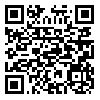Volume 15, Issue 1 (Spring 2023)
2023, 15(1): 27-33 |
Back to browse issues page
Ethics code: IR.NKUMS.REC.1400.166
Download citation:
BibTeX | RIS | EndNote | Medlars | ProCite | Reference Manager | RefWorks
Send citation to:



BibTeX | RIS | EndNote | Medlars | ProCite | Reference Manager | RefWorks
Send citation to:
Khorashadizade F, Sharifian E, Nabavi H, Gerivani T. Investigation of Social Isolation in the Elderly and its Related Factors. North Khorasan University of Medical Sciences 2023; 15 (1) :27-33
URL: http://journal.nkums.ac.ir/article-1-2744-en.html
URL: http://journal.nkums.ac.ir/article-1-2744-en.html
1- Assistant Professor, Department of Nursing, Geriatric Care Research Center, Faculty of Nursing and Midwifery, North Khorasan University of Medical, Bojnord, Iran
2- MSc in Epidemiology, Faculty of Medicine, North Khorasan University of Medical Sciences, Bojnord, Iran
3- Assistant Professor of Gerontology, Faculty of Health, North Khorasan University of Medical Sciences, Bojnord, Iran
4- MSc Student, Department of Nursing, Faculty of Nursing and Midwifery, North Khorasan University of Medical Sciences, Bojnord, Iran ,tayebehgerivani@gmail.com
2- MSc in Epidemiology, Faculty of Medicine, North Khorasan University of Medical Sciences, Bojnord, Iran
3- Assistant Professor of Gerontology, Faculty of Health, North Khorasan University of Medical Sciences, Bojnord, Iran
4- MSc Student, Department of Nursing, Faculty of Nursing and Midwifery, North Khorasan University of Medical Sciences, Bojnord, Iran ,
Abstract: (1722 Views)
Introduction: Social isolation is a multifactorial problem that leads to destructive consequences due to having unique risks for the physical, mental, and social health of the elderly. Therefore, the present study was conducted to determine social isolation and its related factors in the elderly under the coverage of health centers in Bojnord, Iran.
Method: In this cross-sectional, descriptive-analytical study, 605 elderly aged 60 years and above were selected among those under the coverage of health centers in Bojnourd, Iran, using a one-stage cluster sampling method. In order to collect data, valid and reliable questionnaires of demographic characteristics and the Lubben social network scale were completed through an interview with the elderly. Ethical considerations were observed. The data were analyzed using SPSS software (version 24) and statistical tests.
Results: The mean age of the elderly was 69.35±7.22 years of whom 52.6% were male. In total, 47.2% of the cases had social isolation. Social isolation showed a statistically significant decrease concerning variables, such as male gender, more children, higher education level, unemployment and retirement, as well as having a house (P<0.05). However, it did not show a statistically significant relationship with age and marital status (married).
Conclusion: Healthcare systems should pay more attention to the elderly, especially women with few children, housewives, illiterate and poorly educated, and renters
Method: In this cross-sectional, descriptive-analytical study, 605 elderly aged 60 years and above were selected among those under the coverage of health centers in Bojnourd, Iran, using a one-stage cluster sampling method. In order to collect data, valid and reliable questionnaires of demographic characteristics and the Lubben social network scale were completed through an interview with the elderly. Ethical considerations were observed. The data were analyzed using SPSS software (version 24) and statistical tests.
Results: The mean age of the elderly was 69.35±7.22 years of whom 52.6% were male. In total, 47.2% of the cases had social isolation. Social isolation showed a statistically significant decrease concerning variables, such as male gender, more children, higher education level, unemployment and retirement, as well as having a house (P<0.05). However, it did not show a statistically significant relationship with age and marital status (married).
Conclusion: Healthcare systems should pay more attention to the elderly, especially women with few children, housewives, illiterate and poorly educated, and renters
Type of Study: Orginal Research |
Subject:
Basic Sciences
Received: 2022/09/3 | Accepted: 2022/12/26 | Published: 2023/05/27
Received: 2022/09/3 | Accepted: 2022/12/26 | Published: 2023/05/27
Send email to the article author
| Rights and permissions | |
 |
This work is licensed under a Creative Commons Attribution-NonCommercial 4.0 International License. |






